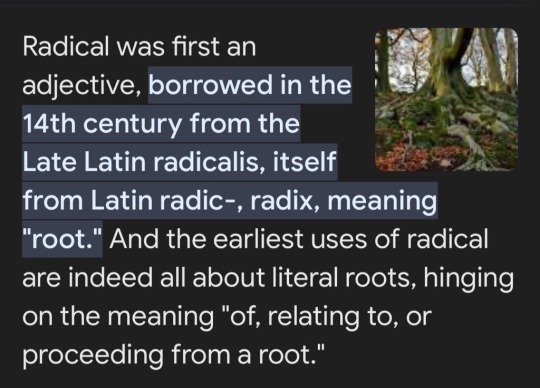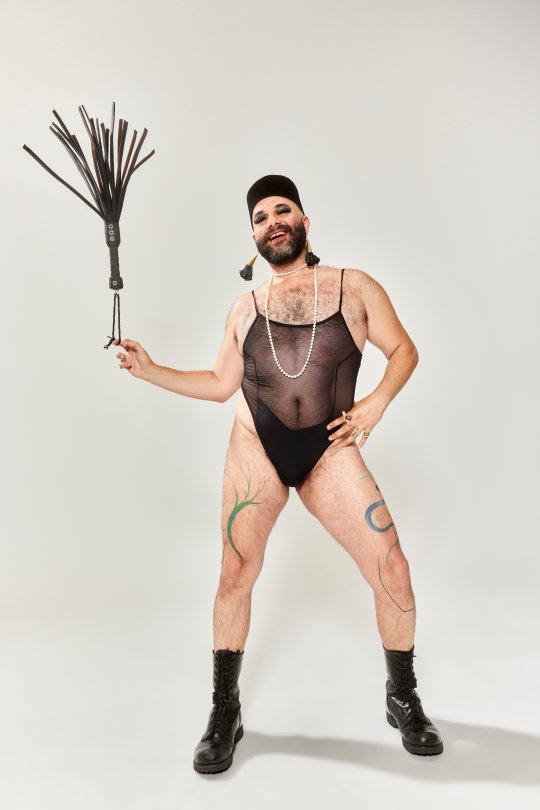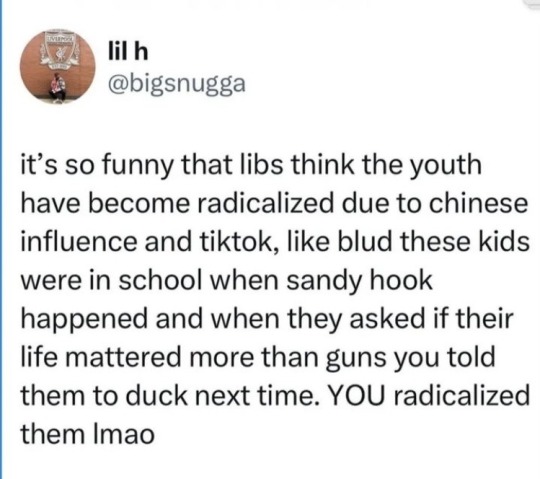#radicalism
Text

#feminism#radicalism#radfem#radfemsinteract#radical feminist safe#radical feminists do interact#rad fem#trans exclusionary radical feminist#liberal feminism#feminist#female separatism#radical feminism#adult human female#biological women#gender critical women#womens rights#lgbtq#lgbt#lgb#transgender#dylan mulvaney#girlhood#foryou#follow#radical feminists do touch#terfsafe#terfblr#terfism#terfs#terf
131 notes
·
View notes
Text
EVERYONE SHUT UP AND LET ME COOK


#i’m drawing parallels#in this essay i will#katniss everdeen#katniss#radicalism#root#sugar coating#sugarbaby#sugar cube#finnick odair#coriolanus snow#tbosas#lucy gray baird#lucy gray#snowbaird#odesta#very cunty#sejanus plinth#coriolanus x sejanus#throwing shade#the library is open#the world changes awful fast
73 notes
·
View notes
Text
A radical analysis of problems and barriers to change may lead to overwhelming pessimism about any radical program; the hardness of a radical analysis can produce political quietism, with radical programs left to the politically naive. To be radical in both senses requires a theory of how this world, for all its problems, contains and is fostering the beginning of another, very different world. Williams labored mightily to hold together these two kinds of radicalism, to keep alive the idea that the many damaged lives he remembered and wrote about would find secular redemption in a transformed world, and that seeking partial solutions and temporary mitigations is not the best that people can do.
34 notes
·
View notes
Text
If you think supporting a middle eastern country who's going through traumatic events is beneath you because "They're homophobic" let me remind you that:
LGBT people exist and live in those countries. And they're struggling with oppression more than anyone else there.
A society that is under the flames of war or is ruled by a radical oppressive government wouldn't grow and evolve culturally. If those nations are going to stop being homophobic, the way western countries did over the last century, they should be set free first.
So please do not keep quiet towards inhuman acts and cruelty. Be a voice to voiceless. We need your support more than ever now.
#mahsa amini#iran#oppression#radicalism#religious oppression#lgbt#lgbtq+#queer#homophobia#transphobia#muslim countries#asexual#gay#lesbian#bi#pan#middle east#politics
452 notes
·
View notes
Text
"Whoever wants to reach a distant goal must take small steps."
Saul Bellow (1915-2005) Canadian American writer.
36 notes
·
View notes
Text

Mama Ganuush
📷 Amber Dawn Mckee
“‘Queer’ means you’re radically supporting liberation for all people. That’s what queer activism is for me. Drag in general is, for me, a form of a protest. It’s a ‘fuck you’ to social norms.” — Mama Ganuush
7 notes
·
View notes
Text

#current events#social justice#human rights#fuck liberals#liberals#political#political posting#politics#us politics#usa politics#united states politics#american politics#fuck the usa#fuck the us government#fuck the united states#tiktok#radicalism
7 notes
·
View notes
Text
Just looked over some rad feminists accounts on here (due to a post talking about tumblr being transphobic but yknow) and I don't know if this applys to all radicalists or just the feminists, but they do not believe in what they are saying. Its all rage bait, and I think I may know why. It's all for power. They don't want better rights due to men being pigs, they just want to be above everyone else without actually trying, being the loudest voice in the room. They like angering people and are *proud* of it due to it giving them attention, and even if its anger, that's enough. No civil discussion can take place because they never took anything they said seriously from the start. But at least It also makes defeating them easy too. Just ignore them, and now their just miserable.
#tumblr#radicalism#men#feminism#same thing for sigma males to women#no andrew tate doesnt care about his fans hes rich from them thats all#remember to understand but never engage#like wild animals
15 notes
·
View notes
Text

Seriously, people who complain about any vaguely liberal idea as socialist have no idea how many of the rights they like and take for granted were won by socialists, abolitionists, suffragettes, black liberationists, and other radicals.
#politics#us politics#progressive#socialism#socialist#radicalism#radical#labor rights#worker rights#working class#conservativism#black power#black liberation#women's suffrage#abolitionist
10 notes
·
View notes
Text
It is easy to become jaded, but less easy to embrace violence
Brian Herbert, The Heir of Caladan
#milquetoast liberal#centrist#moderate#radicalism#brian herbert#herbert#the heir of caladan#dune#2022#herbert 2022#dune saga
5 notes
·
View notes
Text
“Radical views that are outside the mainstream generally (but not always) are more reliable than the dominant view because they are more regularly challenged and tested against evidence. They do not get to float freely down the mainstream; they must swim against the current. They cannot rest on the orthodox power to foreclose dissent, and they are not supported by the unanimity of bias that passes for objectivity.”
— Michael Parenti
#michael parenti#anti capitalism#radicalism#the face of imperialism#socialism#liberation#quote#capitalism#orthodoxy#heterodoxy
42 notes
·
View notes
Text

#israel#muslim#islam#islamic#antisemitism#jewish#judaism#social justice#social issues#feminism#arabic#arab superiority#fuck sharia law#immigration#immigrants#radicalism#history#politics#world news#news
18 notes
·
View notes
Text
youtube
Trump's latest attack INSTANTLY BACKFIRES | Midas Touch | Nov. 24, 2023
Trump's latest attack attempts to frame Democrats as "radical," but in reality its just highlighting his own extremism. Anthony Davis reports.
Anthony Davis discusses how Trump and Republicans are attempting to deflect from their own "radicalization" by painting Democrats as being "radical" for supporting policies that are common in every developed democracy in the world.
Davis shows how Trump and the MAGA Republican party are in fact the only major "radical" political party in the U.S. Davis also suggests they are so "radical," Republicans now have a fascist political agenda.
8 notes
·
View notes
Text
i'm not sure about dialectical materialism...
I spend a lot of time talking about strategies and frameworks for IRL worldbuilding. This can be a bit problematic for a lot of reasons. I’ll start by looking at two: a “democratic centralist” ideological lineage that I disagree with, and a different, more insurrectionary response to that tendency. Now, that is something I have much more respect for, but don’t see it as being able to carry the torch the whole way.
I am someone who sees the importance and benefits of strategic thinking but also understands the negation-oriented spontaneity of uprisings, direct actions, and isolated confrontations. I don’t want (nor do I think it’s possible for) those things to stop, but I want them to be as effective as possible. This means that more people need to become collaborative and autonomous (in the self-directed, can-make-decisions-for-themselves sense). We have to organize around this, and we need a strategy so that we can both make it happen and iterate more successfully.
That’s all I’ll say about that section of things. Anti-organization/anti-strategic folks are dope, but they can’t get us all the way. The best case is that they widen the spaces for autonomy to flourish. The main thing I want to focus on is people who strategize and organize in a centralized way. I’m going to discuss dialectical materialism as it is conceived, and why I think that it blows.
Let’s talk about dialectics and materialism separately for a bit. Dialectics is a way to think about the world, a kind of mental model builder, that allows one to analyze tensions (or contradictions) in society and resolve them in a way more satisfactory than either choice. It is an undergirding idea that can animate further thoughts. Materialism, meanwhile is that the material world/reality itself is what promotes history and social development. Ideas aren’t what make history move, it’s the material conditions. So, the way that they are combined, becoming the philosophy of dialectical materialism is meant to be a framework to allows us to understand and critique society so that we can make it more liberatory.
Dialectical materialism is an idea that I’ll mostly attribute to Stalin that sees social change and history through understanding contradictions and material circumstances. It’s meant to understand the base of society, which is the economic mode of production, and the superstructure, which is everything that is birthed from that economic mode of production. So things like culture, art, ideology, etc. Base = economics, Superstructure = the rest of the pieces of society. Got it?
While this may sound great, dialectical materialism as a framework has some glaring blind spots. People don’t act purely from a place of rationality or determinism based on their conditions. Said otherwise, you cannot look solely at material conditions and understand why the world is why it is, or why people act the way that they do. We have to dialectically (ha) look at the tension between materialism and idealism, analyzing both of their places in the world. With this in mind, the way that dialectics are bundled with materialism (creating the philosophy of dialectical materialism) claims scientific rigor without proving it through a relationship of experimentation and iteration. There isn’t enough empirical evidence to support this conception of dialectical materialism.
It leaves me to question whether or not a more holistic, systems & complexity-oriented method/philosophy can surpass dialectical materialism. Complexity theories, namely the ideas of self-organization, emergence, chaos, and entropy are exciting and interesting ways to see how social change works. Rather than a simple machine, societies are complex adaptive systems that are more than just resolving tensions between contradictions. A useful mental model builder is DSRP (Distinctions, Systems, Relationships, and Perspectives) structures. Distinctions are about looking at the elements/agents within a system, where identifying one element implies the existence of other elements. Systems are an understanding whole that necessitates parts. Relationships are the actions and reactions between the other structures (Distinctions, Systems, other Relationships, and Perspectives). Perspectives are specific positions/points, implying a view. Using DSRP, we can construct models of systems and understand them on a holistic level, rather than reducing the fidelity of our analysis to our detriment. DSRP, similarly to dialectical materialism, is a fractal tool, creating as little or as much fidelity as we would like in our models.
I think that the most damning thing for dialectical materialism is a lack of understanding of how power functions within both the base and the superstructure, influencing and steering social forces. Power is a relationship between both people and their positions within a society. By not questioning the form that power takes (power-over vs. power-to vs. power-with), it cannot actually resolve the contradictions within society meaningfully. It undermines the whole project. We need to unpack the multifaceted nature of inequality, relating to all of the vectors that identity exists (race, gender, ability, sexuality, etc.) and seeing their relation to the structure as both of and from that structure. How social discourses, institutions, and practices reinforce matrixes of domination is very important to understand.
But maybe this doesn’t mean that we fully discard dialectics and materialism. I see them as something that can complement complexity theory and a liberatory power analysis. Dialectics are a great way to look at shifting terrains and sites of struggle, based on our understanding of the complex adaptive system of society. We also need to understand the material world, which benefits from a holistic scientific framework like understanding complexity. Ecosystems (a descriptive, holistic science) are a much more useful touchstone for understanding society than physics (a prescriptive, reductionist science). Oppressive ideas come from material conditions and are shaped by power structures. We could critically employ dialectical materialism to get a fuller picture, but that comes from being in concert with other tools.
Instead of fully abandoning it, we can integrate some of the most useful insights from dialectics and materialism, blending them into more modern systems analysis and theories of power. This has to be done in concert with those marginalized by society. Fuddy-duddies are the ones who have bungled everything, so it’s time to pass the torch. If we can do this, if we can empower the folks on the furthest margin, they will be able to emancipate themselves with a theory that simultaneously facilitates a building of dual power, contesting oppressive power, and ushering in a new world.
#economics#economy#econ#anti capitalists be like#neoliberal capitalism#late stage capitalism#anti capitalism#capitalism#activism#activist#direct action#solarpunks#solarpunk#praxis#socialism#sociology#social revolution#social justice#social relations#social ecology#organizing#complexity#resist#fight back#organizing 101#radicalization#radicalism#prefigurative politics#politics#mobilize
10 notes
·
View notes
Text
Jumbo Shrimp
Exact Estimate
Military Intelligence
Religious Education
Human Resources
Peacekeeper Missile
Compassionate Conservative
Right-wing Radical
Anarcho-capitalist
Communist/Left-wing Corporation
Affordable Healthcare
Left Libertarian
Liberal Democracy
Illegal Alien
Ethical Capitalism
Authoritarian Left
#oxymoron#anti capitalism#anti capitalist#socialism#democratic socialism#leftism#leftist#leftists#replace the constitution#radicalism#left wing#conservatives#conservatism#inalienable rights#right wing#democracy#liberalism
6 notes
·
View notes
Text
"We are social creatures to the inmost centre of our being. The notion that one can begin anything at all from scratch, free from the past, or unindebted to others, could not conceivably be more wrong."
Karl Popper (1902-1994) British philosopher of science.
45 notes
·
View notes